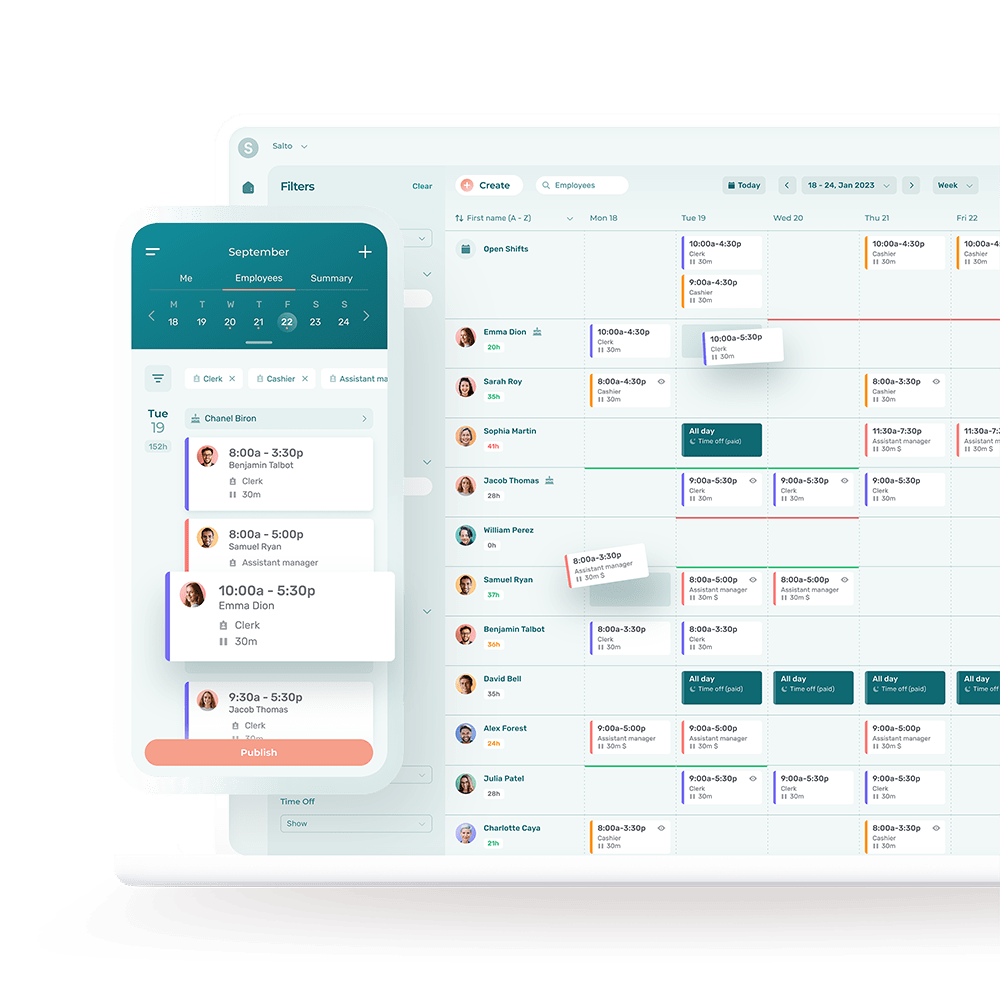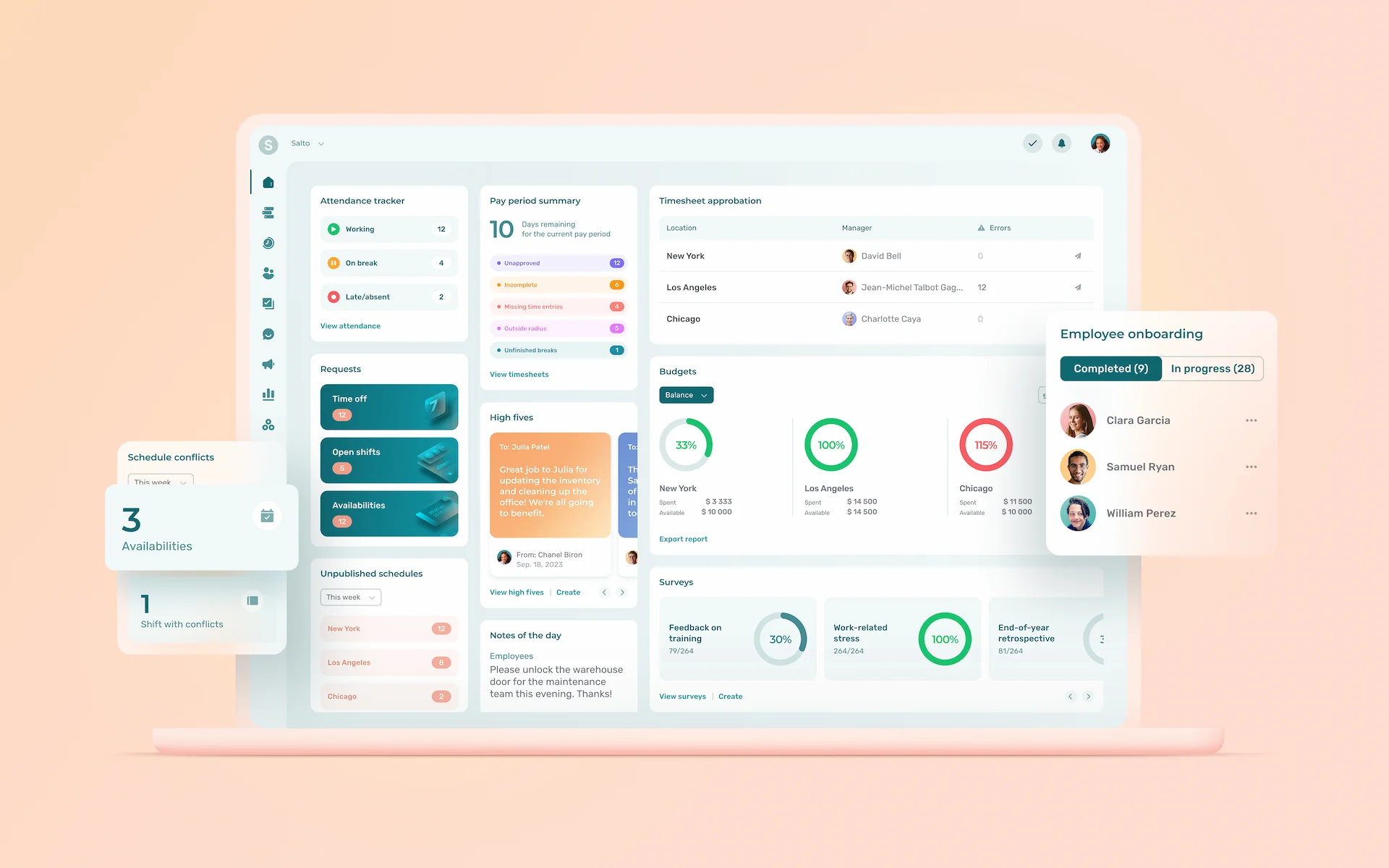The restaurant manager coordinates all activities to ensure quality of service, customer satisfaction, and the success of the establishment.
- Restaurant Manager: A Versatile Role
- Restaurant Manager Job Description
- Conclusion
- Your questions answered.
Restaurant managers have a multitude of responsibilities and tasks to perform. Whether you’re contemplating a career in the restaurant business or looking for your next restaurant manager, this article will give you all the information you need to better understand what this role is all about.
This article will cover:
- The five aspects of a restaurant manager’s role
- What to put in a restaurant manager’s job description
- Two concrete examples of job descriptions
Restaurant Manager: A Versatile Role
Restaurant management is a key role in the success of any restaurant. As such, the tasks are diversified and can have as much to do with personnel management as with inventory and customer service.
Restaurant managers typically have many years’ worth of experience in the industry, and are fully conversant with all the management tasks involved.
The role of a restaurant manager can be divided into 5 categories of responsibilities.
1. Staff Management
Every day, restaurant managers have to carry out personnel management tasks. This is a very large part of their responsibilities.
Some managers will be responsible for managing both the front-of-house team and the back-of-house kitchen. In some restaurants, the head chef will be responsible for managing his or her own team, thus lightening the restaurant manager’s load.
Managers need to plan their workforce needs, including recruiting, hiring, and training new employees. They must also take the time to welcome and onboard new recruits into their team.
To ensure the smooth running of the team, the time needed to resolve conflicts between employees must not be neglected. Restaurant managers must also be sure to give feedback to their staff and recognize their good work when necessary in order to boost their commitment and motivation.
At least once a year, it is also necessary to carry out performance evaluations and update training as required.
If managers don’t invest enough time in employee management, the restaurant risks seeing its turnover rate rise. Indeed, if employees don’t feel recognized and valued, they’re unlikely to value their job for long.
2. Time Management and Working Hours
Time and attendance management is intimately linked with employee management.
To ensure quality of service, managers need to plan schedules rigorously. They must also keep track of employees’ working hours and ensure that their team members are in the right place at the right time.
Thus, while some managers still choose to use a restaurant work schedule template, many others opt for employee scheduling software like Agendrix to streamline their tasks.
They can quickly create schedules based on employees’ availability and preferences, manage time-off requests in just a few clicks, and even approve shift swap requests.
Schedules are shared with employees directly on the app, and employees receive updates when changes do occur. Managers can even find replacements quickly by creating open shifts. Gone are the days of chain texting, group Facebook Messenger exchanges, and endless phone calls.
This feature can also be useful when the restaurant is busier than expected and more employees are needed on the floor, or when an employee calls in sick.
If someone tells me that a waiter is missing, it’s easy for me to react right away. I’ve got everything at my fingertips.
– Étienne, manager, Bar Renard
Some software packages even offer a business communication tool that allows employees to write directly to their manager. The separation between everyone’s personal and professional lives is thus clearer. For example, it prevents managers from having to become Facebook friends with their entire staff.
3. Inventory and Stock Management
One of the less visible responsibilities of restaurant managers is stock and inventory management. They are responsible for ordering the products, tools, and foodstuffs needed to keep operations running smoothly.
As such, they must manage links with suppliers to ensure that deliveries are scheduled on the right dates, negotiate prices to ensure the restaurant’s profitability, and arrange the various payments.
With the help of the kitchen team, they must also check that the inventory is accurate, so as to be able to anticipate needs and avoid service disruptions.
Managing stock and inventory requires a great deal of precision and rigor.
4. Customer Service
Managers ensure the quality of customer service offered in their establishment by properly training employees. They must ensure that employees understand how customers should be served and what excellent service is like in their restaurant. They are also responsible for training staff on the menu, beverages, allergies, emergencies, etc.
Managers must also create and improve various processes, such as the reservation system, to ensure an exceptional customer experience across the board.
In addition, they are responsible for managing customer complaints and responding to online reviews to maintain the establishment’s reputation.
5. Administrative Tasks
Finally, restaurant managers also have various administrative tasks to perform. For example, they might have to fill out sales reports and communicate the results with the restaurant owner(s).
They must also create and implement marketing strategies to maximize or improve the company’s sales. They may plan social media or traditional media campaigns to attract new customers, for example.
Restaurant Manager Job Description
To know if you have the right profile or to find the ideal candidate, it’s important to understand the responsibilities, skills, and tasks involved in the role of restaurant manager.
Here’s a complete list of the responsibilities, skills, and tasks of a restaurant manager, plus two concrete examples.
Responsibilities of a Restaurant Manager
The responsibilities of a restaurant manager include:
- Coordinating the day-to-day operations of the restaurant’s customer service and kitchen teams
- Ensuring customer satisfaction
- Ensuring the quality of dishes served and customer service
- Responding professionally to customer complaints
- Motivating employees to give their best
- Training staff
- Planning work schedules according to labor needs
- Managing inventory
- Ensuring compliance with health and safety protocols
- Managing the budget
- Managing employees
- Creating sales reports
- Implementing strategies to increase sales
- Organizing events as needed
Skills of a Good Restaurant Manager
The skills of a good restaurant manager include:
- The ability to communicate well with team members
- Leadership skills
- The ability to provide excellent customer service
- Problem-solving skills
- Organizational skills
- The ability to perform administrative tasks
- The ability to manage a budget
- The ability to work under pressure and manage stress at work
- A good understanding of the food service industry
Duties of a Restaurant Manager
The tasks of a restaurant manager include:
- Assigning restaurant sections to servers
- Placing product orders (food, work tools, household products, etc.)
- Conducting one-on-one meetings with employees
- Evaluating employee performance
- Creating work schedules
- Managing employee conflicts
- Resolving customer complaints
- Updating personnel files
- Sending timesheets to the payroll system
- Creating marketing promotions as needed
- Coordinating advertising for the restaurant
- Implementing and optimizing protocols and processes
- Recruiting and hiring new employees
- Updating budgets
Skills and Requirements
The experience and education required to become a manager can vary greatly depending on the type of establishment: gourmet restaurant, café, canteen, franchise, fast food chain, bistro, etc.
Most restaurants require managers to have several years of experience in the industry, including experience in a management position. A graduate degree in management or administration might also be required.
Some restaurants may also decide to award the position to an employee with several years of experience, regardless of education.
Sample Job Description: Manager for a Fast-Food Chain
About the job
The restaurant manager is the backbone of our team. Their job is to ensure that every day at the restaurant is an incredible experience for our customers and our team. They manage day-to-day operations, motivate the team, and ensure that everything runs smoothly. The manager must be a leader and willing to work as part of a team to achieve goals.
Main responsibilities
- Managing stock and inventory to ensure we never run out of anything
- Creating work schedules according to team members’ preferences and availability
- Ensuring that the kitchen is clean and safe
- Training employees
- Handling customer complaints and suggestions with professionalism
- Creating relevant sales reports
- Working with the Branch Manager to optimize processes and ensure business success
Experience and training
- Minimum 5 years of relevant experience in a similar management position
- Advanced degree in business administration, hotel, or restaurant management, or other relevant field
Sample Job Description: Manager for a High-End Restaurant
The restaurant manager’s role
The restaurant manager is responsible for overseeing all restaurant operations, ensuring that every aspect of the dining experience is orchestrated to perfection. The manager must have extensive industry experience, strong leadership skills, and a passion for the restaurant business.
Main responsibilities
- Managing the restaurant’s day-to-day operations, including service, kitchen, and dining room
- Recruiting, training, and supervising an exceptional team of restaurant professionals
- Overseeing the men, food preparation, and plate presentation
- Managing reservations and coordinating special events
- Monitoring key performance indicators and manage costs to maximize restaurant success
Experience and training
- Degree in hotel management, food service, or relevant field
- Minimum of 10 years of experience in the management of a gastronomic establishment
- In-depth knowledge of fine cuisine, wine, and high-end service
Conclusion
The role of restaurant managers is complex and crucial to any restaurant’s operations and success. It also plays a decisive role in the company’s success as regards employee retention, work atmosphere, and quality of service.
To accomplish all these tasks, managers need to have access to high-performance tools. That way, they can concentrate on other tasks that are just as important to the company’s development.
What Are the Duties and Responsibilities of a Restaurant Manager?
The duties and responsibilities of a restaurant manager include:
- Creating employee work schedules
- Managing orders and inventory
- Ensuring quality customer service
- Organizing events
- Handling customer complaints
- Processing employee leave requests
- Creating sales reports
- Implementing strategies to optimize sales
- Recruiting, hiring, and training new employees
- Sending timesheets to the payroll system or department
- Updating protocols and processes
- Ensuring restaurant cleanliness
What Makes a Good Restaurant Manager?
The qualities of a good manager include:
- Communication
- Listening
- Organization
- Leadership
- Teamwork
What Are the Advantages and Disadvantages of Working As a Restaurant Manager?
The benefits of working as a restaurant manager include:
- The variety of tasks to be accomplished
- Stimulating work environment
- Human interaction
The disadvantages of working as a restaurant manager include:
- Atypical schedules, including evenings and weekends
- Long shifts
- The sheer number of tasks involved


- Restaurant Manager: A Versatile Role
- Restaurant Manager Job Description
- Conclusion
- Your questions answered.










